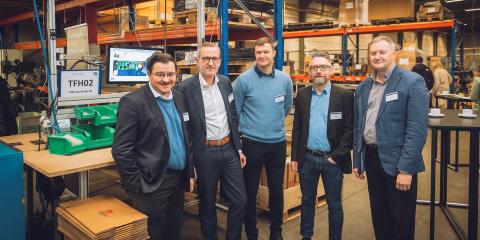Innovative technologies lighten workload

To achieve an 80% employment rate and address labour market tightness, we not only need to get more people working, but also keep current workers working. Innovative technologies, such as exoskeletons, augmented reality, virtual reality and cobots, can play an important role in making and keeping jobs employable. Flemish Minister for Work and Innovation Jo Brouns therefore launched the living lab "Technology for Workable Work." Today, the first results of the project will be demonstrated at the Open Atelier in Pelt.
Having a workable job is an important factor in keeping or getting people permanently employed. On the initiative of Flemish Minister for Work and Innovation Jo Brouns, investments are therefore being made in innovative technologies to support employees and companies more and better in this respect. Within the living lab 'Technology for workable work', state-of-the-art innovative technology is deployed to make work more workable, both physically and mentally. These include digital work instructions, exoskeletons, virtual reality and augmented reality. These kinds of technologies also offer opportunities to (re-)employ people who, for physical or mental reasons, experience a distance from the labour market.
Overcoming tresholds
Indeed, the main thresholds for Flemish employees in the industrial sector to stay at work are a high workload, physical strain and monotony of work, according to research conducted by the HIVA Research Institute (KU Leuven) as part of this living lab. The first results of the project were presented and demonstrated today at the 'Open Atelier' learning workplace in Pelt.
Exoskeletons replace overalls
The Industry 4.0 living lab 'Technology for Workable Work', was launched by VLAIO in 2022 on the initiative of Flemish Minister of Work and Innovation Jo Brouns.
In this living lab, together with our core labs UHasselt (EDM) and VUB (R&MM), we are joining forces with:
With success: in the past year we worked together on technology demos that led to support tools for the mental, physical and organisational needs of specific target groups on the labour market.
Open Atelier as demo hall
To illustrate this, today the "Open Atelier" apprenticeship centre in Pelt was transformed into a demo hall bringing together state-of-the-art innovations. Exhibits included co-bots, robotic arms that stand next to employees as colleagues, so to speak, and can provide the necessary support on the shop floor. A dashboard system that knows, can visualise and monitor every step of a process in real time ensures that employees can never miss a step in a process. Augmented Reality, in turn, can provide polishing assistance by colouring invisible dirt to tell the difference between clean and dirty surfaces.
These and other technologies on display offer innovative solutions to the challenges faced by workers in the manufacturing industry today. Thus, this living lab offers concrete examples to the broad sector of the manufacturing industry that can make work more workable.
It is important that everyone can get and stay at work safely and healthily. Workable work is therefore crucial for me.
Jo Brouns
Flemish minister for employment and innovation
Investment of EUR 2.4 million
Last year, 144 companies already participated in actions of the living lab. The ambition of Minister Brouns and the project partners is to have reached around 800 companies with the project's technologies and further actions by the end of 2024. 2.4 million euros will be invested over 3 years through VLAIO.
'It is important that everyone can enter and stay at work safely and healthily. Workable work is therefore crucial to me; it is also one of the four pillars in the new Flemish Employment Agreement," concludes Flemish Minister for Work and Innovation Jo Brouns. 'With this living lab, we show that innovative technologies are also a solution in this story. Exoskeletons, cobots, virtual reality or digital work instructions can catapult us forward to make jobs more physically and mentally bearable. Innovations that to many still sound like distant futures are often already in production today and widely applicable in the workplace, which is what we want to illustrate to companies with this project.'
